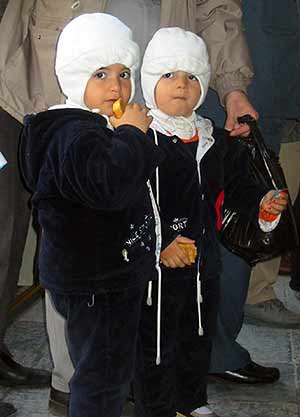A brief flurry of excitement in the office this afternoon after Iranian state radio's Pashto service reported that Osama Bin Laden had been captured in a tribal area of Pakistan.
In an attempt to get to the bottom of the storty we called IRNA's Pashto section.
The conversation went something along the lines of:
"Can you tell us more about your story about Osama Bin Laden being captured?"
"Well, you know, this is an old story. We reported that he'd been captured a year ago. I have very good sources in the area and they assure me it's true."
"If Bin Laden has really been captured why isn't IRNA's Farsi service broadcasting the news? Why is it only the Pashto service?"
"I don't know. Maybe they don't think it's an important story."
It's possible that IRNA thinks the capture of the world's most wanted man doesn't meet its criteria for an Important News Story -- but I think it's far more likely that they realise it's a crock of shit.
It's not quite the same as broadcasting as fact a rumour that you've just been told by someone down the pub (not that there are any pubs in Iran) -- but it's not a million miles away.
Saturday, February 28, 2004
Following my posting a few days ago about the poor quality of canapes at the British Embassy I've received an e-mail from Karen, a British ex-pat living in Tehran.
She runs a catering company here -- Karen's Spicy Kitchen -- and her fare looks far more enticing.
(Do I get commission for the mention?)
Karen's Menu (.doc)
She runs a catering company here -- Karen's Spicy Kitchen -- and her fare looks far more enticing.
(Do I get commission for the mention?)
Karen's Menu (.doc)
A reminder to anyone wanting to listen to or view the multimedia files that you need to download them to your hard drive first by right-clicking and choosing "save target as..." before you play them.
Friday, February 27, 2004
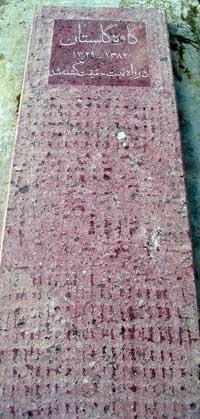
This afternoon I made a long awaited journey.
I headed up into the Alborz mountains to the north of Tehran to the village of Afjeh, where Kaveh is buried.
It was an emotional journey. I'd only seen Kav's grave in pictures and to see it with my own eyes brought back all the memories of that day almost a year ago when he died and I was injured.
Even though his name was written on the grave stone, it didn't seem to me like he was there. Kaveh's mother, Fakhri, insists her son's not in the ground. She says he's somewhere up in the snow-frosted mountains surrounding the graveyard.
I think she's right.
I shot some video in Afjeh and have made up a short videoblog because I don't feel like writing about it.
It's 1'34" long and is 626Kb.
Afjeh Videoblog (.wmv)
The US Campaign to Ban Landmines joins the condemnation of President Bush's new mine policy.
"This is another squandered opportunity for US leadership on a crucial arms control and humanitarian issue," says Senator Patrick Leahy of Vermont.
"Worst of all, in a sharp departure from past policy, it says the United States will continue using landmines indefinitely.
"We are by far the most powerful nation on earth, and the world looks to us for leadership on this issue. When we back away from the progress we have pledged to rid the world of these indiscriminate weapons, others will ask why they, with their much weaker armed forces, should stop using them.”
USCBL spokeswoman Gina Coplon-Newfield adds:
"US refusal to join this treaty sets a dangerous, isolationist example to mine-using countries such as Russia, India, and Pakistan that have laid hundreds of thousands of mines in recent years with devastating consequences to civilians."
"This is another squandered opportunity for US leadership on a crucial arms control and humanitarian issue," says Senator Patrick Leahy of Vermont.
"Worst of all, in a sharp departure from past policy, it says the United States will continue using landmines indefinitely.
"We are by far the most powerful nation on earth, and the world looks to us for leadership on this issue. When we back away from the progress we have pledged to rid the world of these indiscriminate weapons, others will ask why they, with their much weaker armed forces, should stop using them.”
USCBL spokeswoman Gina Coplon-Newfield adds:
"US refusal to join this treaty sets a dangerous, isolationist example to mine-using countries such as Russia, India, and Pakistan that have laid hundreds of thousands of mines in recent years with devastating consequences to civilians."
The Washington Post reports (registration required) on a planned shift in the US's stance on landmines.
The Post says President Bush is to outlaw so-called "dumb" or "inert" landmines -- but allow the unlimited use of what are inappropriately called "smart" mines (BBC News Online also has the story.)
It's a deeply disturbing and utterly cowardly move.
The Bush administration is increasing spending on mine clearance and mine awareness programmes by 50% as a way of deflecting attention from the real issue -- that five years after it was accepted into international law, the USA still has not signed the Ottawa Mine Ban Treaty. That puts America in the same category as every other country in its much-vaunted Axis of Evil -- Iran, Iraq and North Korea (the full list of non-signatories can be found here.)
It would appear that President Bush has abandoned Bill Clinton's plans for a total ban on antipersonnel landmines by 2006.
Any initiative to reduce the use of landmines is, of course, welcome. But if the Bush administration really wants to do something to tackle the worldwide landmine problem it should take the lead and join the 150 countries that have signed the Mine Ban Treaty, which outlaws allanti-personnel mines.
The Post says President Bush is to outlaw so-called "dumb" or "inert" landmines -- but allow the unlimited use of what are inappropriately called "smart" mines (BBC News Online also has the story.)
It's a deeply disturbing and utterly cowardly move.
The Bush administration is increasing spending on mine clearance and mine awareness programmes by 50% as a way of deflecting attention from the real issue -- that five years after it was accepted into international law, the USA still has not signed the Ottawa Mine Ban Treaty. That puts America in the same category as every other country in its much-vaunted Axis of Evil -- Iran, Iraq and North Korea (the full list of non-signatories can be found here.)
It would appear that President Bush has abandoned Bill Clinton's plans for a total ban on antipersonnel landmines by 2006.
Any initiative to reduce the use of landmines is, of course, welcome. But if the Bush administration really wants to do something to tackle the worldwide landmine problem it should take the lead and join the 150 countries that have signed the Mine Ban Treaty, which outlaws allanti-personnel mines.
Thursday, February 26, 2004
CIA Director George Tenet touched on the Iranian elections in his testimony before the
Senate Select Committee on Intelligence.
Tenet's assessment:
"With the victory of hardliners in elections last weekend, governmental led reform received a serious blow. Greater repression is a likely result.
"When the new Majles convenes in June, the Iranian government will be even more firmly controlled by the forces of authoritarianism....and with the Majles securely behind the hardliners, we expect to see many of the outlets for political dissent shut down by the clerical regime.
"The prospect of internal violence remains. Hardliners may now resort to new heavy-handedness that produces public outrage and protest.
"Even so, the Iranian public does not appear eager to take a challenge to the streets—in Tehran, apathy is the prevailing mood, and regime intimidation has cowed the populace. This mix keeps the regime secure for now."
Senate Select Committee on Intelligence.
Tenet's assessment:
"With the victory of hardliners in elections last weekend, governmental led reform received a serious blow. Greater repression is a likely result.
"When the new Majles convenes in June, the Iranian government will be even more firmly controlled by the forces of authoritarianism....and with the Majles securely behind the hardliners, we expect to see many of the outlets for political dissent shut down by the clerical regime.
"The prospect of internal violence remains. Hardliners may now resort to new heavy-handedness that produces public outrage and protest.
"Even so, the Iranian public does not appear eager to take a challenge to the streets—in Tehran, apathy is the prevailing mood, and regime intimidation has cowed the populace. This mix keeps the regime secure for now."
My posting a few days ago about the Paykan is the basis for a piece I've just filed for From Our Own Correspondent.
I believe it'll be broadcast on the BBC World Service this Saturday but you can hear it first by clicking on the link below.
The file is 3'52" long and is just under 600Kb.
Audioblog: From Our Own Correspondent (.wma)
I believe it'll be broadcast on the BBC World Service this Saturday but you can hear it first by clicking on the link below.
The file is 3'52" long and is just under 600Kb.
Audioblog: From Our Own Correspondent (.wma)
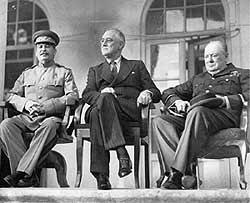
Went to a reception at the British Embassy last night to mark the opening of an exhibition of British art at the Tehran Museum of Contemporary Art .
It was at the Embassy, in 1943, that Roosevelt, Churchill and Stalin held the "Tehran Conference" to discuss the opening of a second front in western Europe.
Stalin agreed to an eastern offensive to coincide with the forthcoming western front, and he pressed the Western leaders to proceed with formal preparations for their long-promised invasion of German-occupied France.
On Iran, which Allied forces were partly occupying, they agreed a declaration guaranteeing post-war independence and territorial integrity and promising economic assistance.
Amazing history -- but crap canapes.
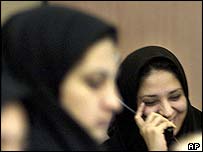
BBC News Online reports on the mobile phone frenzy currently gripping Tehran as another tranche of government-issued SIM cards goes on sale.
The mobile network here is a nightmare.
Unlike in many countries you can't just walk into a shop and buy a local SIM card and slot it into your mobile. You have to know someone who knows someone who can get you access to Iran's creaking cellular network.
It took me two days before I managed to find someone willing to rent me their SIM card -- at vast expense -- for the duration of my stay.
Advance notice that the International Campaign to Ban Landmines is holding a publicity drive on Monday March 1st to mark the 5th anniversary of the Ottawa Treaty (coincidentally timed to coincide with my birthday!)
Tuesday, February 24, 2004

Many journalists writing about Iran focus on the obvious problems in this country -- the human rights violations, the restrictions on freedom of expression, the need for women to cover up in public.
All are real – and with up to 70% of Iranians under the age of 30 there’s a huge number of young Iranians yearning for change.
I’ve already experienced, in a very minor way, the petty rules that are an everyday fact of life in Iran.
After dinner in a Persian restaurant a few nights ago I asked for a ghalyan -- a water pipe known in other parts of the Middle East as a shisha or nargila or to westerners as a hubbly-bubbly.
I was told I couldn’t have one – they’ve been banned in public places.
It seems the authorities were worried that young people were having too much of a good time sitting around, chatting and smoking. There was particular concern about the mixing of the sexes. Women were spending too much time lounging around on cushions tooting away on pipes in the company of men. Something had to be done.
About six months ago the Amaken -- the government body which regulates restaurants, hotels, cinemas and the like – banned women from smoking a ghalyan. Then, a few weeks ago, they were outlawed completely and indefinitely.
But over dinner last night, I spoke to two Iranian women who gave me a very different perspective on life in modern Iran.
Both are in their 30s and so can remember the early days after the revolution in 1979. Both are well travelled, well educated and internationalist in outlook.
“Things are not perfect now,” one told me, “But they’re a million times better than they were just after the revolution.”
“I remember in the early 1980s, I was out with my sister one day. She climbed over a wall and as she did a tiny strip of her ankle showed beneath her trousers.
“One of the police officers who guards Islamic values immediately came over to her and ordered her to cover up – but she’d only displayed a tiny, tiny bit of flesh – and only for a second.
“That’s what life was like in the early days of the revolution.
“I was living abroad for ten years and finally came back to Iran in 1999. I couldn’t believe how much things had changed. When I left all women wore the full black chador – and all the men had beards.
“When I returned things were much more relaxed. Women only had to wear a hejab – a headscarf – and I was amazed to see clean shaven men.
“People say Iranian society is terrible now – but they should have been here a decade ago.”
My friends pinpointed the start of the relaxation in Iranian society to the election of Mohammed Khatami, the reformist president who came to power in 1997.
But with the reformists beaten in the general election, and Khatami looking increasingly isolated, surely there’ll be another crackdown, I said. On the eve of the elections another two newspapers were shut down by the hardliners – won’t others follow?
“The Conservatives know they can’t go back,” they told me.
“Even some of the hardliners are much more relaxed than they were a few years ago.
“Anyway, they know that if they try to take away the freedoms that we have there’ll be an outcry.”
I hope they’re right.
The Guardian reports on the story that journalists embedded during the Iraq war will be eligible for a military medal -- and reflects the concern I raised yesterday over the ethics of accepting such a gong.
Embedded Guardian journalist Audrey Gillan says she won't be claiming hers.
"I'm not going to take it for a number of reasons," she says.
"One of them is I'm not a soldier, I'm a journalist. I was there as an independent witness for the Guardian, not for the government."
Quite so.
Embedded Guardian journalist Audrey Gillan says she won't be claiming hers.
"I'm not going to take it for a number of reasons," she says.
"One of them is I'm not a soldier, I'm a journalist. I was there as an independent witness for the Guardian, not for the government."
Quite so.
I came face to face with Iran’s labyrinthine and baffling bureaucracy this morning – but amazingly managed to come away with a result.
With my week-long visa due to expire at midnight, it was vital that I tried to get an extension. I had a flight booked to London via Dubai this afternoon just in case the authorities refused.
My first task was to get a letter agreeing an extension from the Foreign Press department of the scarily named Ministry of Culture and Islamic Guidance.
With that in hand I deposited 100,000 Iranian Rials (the equivalent of about 10 US dollars) into the bank and took the receipt to the Immigration Bureau.
The Immigration Bureau – or Police Department of Aliens Affairs as it’s officially known -- is located on a traffic-clogged street in central Tehran and on a windless day like today the pollution was even worse than usual. I went inside, my eyes watering from the exhaust fumes. I was immediately hit by another eye-watering stink – the overpowering sour smell of stale sweat in the waiting room. Crowds of shabbily dressed men, many of them Afghan migrants working in Iran’s construction industry, were waiting around forlornly.
Some looked as if they’d been hanging around there for weeks.
Signs on the wall in Farsi and English informed women that “TO BE IN ISLAMIC VEIL IS NECESSARY.”
My driver, Nader, guided me effortlessly through the paperwork. I’d have been lost without him. Two forms, a pile of photocopies and a couple of pictures were slipped into a pink folder and added to the mountainous pile of pink folders teetering in a heap behind the counter.
Nader spun the immigration official a line about how the application was very urgent because I was a journalist in a hurry and we took our seats alongside a haggered Afghan flicking worry beads between his fingers.
An hour or so later it was ready….a 2 week extension allowing me to stay in Iran until March 10th.
With my week-long visa due to expire at midnight, it was vital that I tried to get an extension. I had a flight booked to London via Dubai this afternoon just in case the authorities refused.
My first task was to get a letter agreeing an extension from the Foreign Press department of the scarily named Ministry of Culture and Islamic Guidance.
With that in hand I deposited 100,000 Iranian Rials (the equivalent of about 10 US dollars) into the bank and took the receipt to the Immigration Bureau.
The Immigration Bureau – or Police Department of Aliens Affairs as it’s officially known -- is located on a traffic-clogged street in central Tehran and on a windless day like today the pollution was even worse than usual. I went inside, my eyes watering from the exhaust fumes. I was immediately hit by another eye-watering stink – the overpowering sour smell of stale sweat in the waiting room. Crowds of shabbily dressed men, many of them Afghan migrants working in Iran’s construction industry, were waiting around forlornly.
Some looked as if they’d been hanging around there for weeks.
Signs on the wall in Farsi and English informed women that “TO BE IN ISLAMIC VEIL IS NECESSARY.”
My driver, Nader, guided me effortlessly through the paperwork. I’d have been lost without him. Two forms, a pile of photocopies and a couple of pictures were slipped into a pink folder and added to the mountainous pile of pink folders teetering in a heap behind the counter.
Nader spun the immigration official a line about how the application was very urgent because I was a journalist in a hurry and we took our seats alongside a haggered Afghan flicking worry beads between his fingers.
An hour or so later it was ready….a 2 week extension allowing me to stay in Iran until March 10th.
Monday, February 23, 2004
WHAT DO YOU WANT? A MEDAL?
Thanks to Alex for this story from the Press Association wire.
It says that members of the media embedded with British forces during the Iraq war are to be honoured alongside service personnel with a campaign medal.
The Iraq Medal recognises service in and in support of operations in Iraq from January 20, 2003 -- including the services of MoD-accredited media workers.
That means many of my colleagues who reported on the war will have a nice shiny gong to pin on their jackets.
I, however, as a "unilateral" journalist -- working in Iraq outside the Ministry of Defence's accreditation system -- won't.
Call it sour grapes if you like but I think accepting the same commendation as military personnel crosses a fundamental line. Are we independent journalists -- or are we adjuncts to the armed forces?
Medals and awards are all very nice, but they should come from humanitarian or press freedom organisations -- not the government.
Thanks to Alex for this story from the Press Association wire.
It says that members of the media embedded with British forces during the Iraq war are to be honoured alongside service personnel with a campaign medal.
The Iraq Medal recognises service in and in support of operations in Iraq from January 20, 2003 -- including the services of MoD-accredited media workers.
That means many of my colleagues who reported on the war will have a nice shiny gong to pin on their jackets.
I, however, as a "unilateral" journalist -- working in Iraq outside the Ministry of Defence's accreditation system -- won't.
Call it sour grapes if you like but I think accepting the same commendation as military personnel crosses a fundamental line. Are we independent journalists -- or are we adjuncts to the armed forces?
Medals and awards are all very nice, but they should come from humanitarian or press freedom organisations -- not the government.
TRAVELS IN THE AXLES OF EVIL -- IN PRAISE OF THE PAYKAN
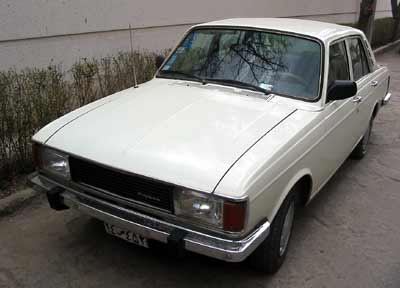
Breathing in a lungful of Tehran air is a full-frontal assault on the respiratory system.
Your eyes sting. Your nose burns. Your lungs tighten.
A thick petrochemical smog hangs over this city of 12 million people for much of the year, bathing it in a purply-grey haze. At times the pollution is so bad it blocks the view of the Alborz mountains to the north, where wealthy Tehranis escape to ski and take a break from the chronic overcrowding.
A taxi ride through Tehran can often seem like an afternoon jaunt on the frontline of a war zone.
Cars hurtle in every direction, coughing out exhaust fumes and squeezing through the most impossibly tight gaps in the traffic. Drivers pull out from curbs at wild angles, forcing motorists to swerve suddenly to avoid a collision.
Trying to follow another vehicle through Tehran’s streets is almost impossible because the majority of them are identical. Some 70% of cars on the capital’s roads are battered, white(ish) Paykans.
The Paykan, Iran’s equivalent to the East German Trabant, will look familiar to many British eyes. It’s a locally-made version of the Hillman Hunter, a box-like sedan manufactured in the UK during the 1960s and 1970s.
The Paykan (the word means “arrow” in Farsi) was the first car to be manufactured in Iran, in 1967. Two models were sold at first – the “standard” and the ambitiously named “deluxe.” The range soon expanded to include a Paykan taxi, pick-up and even an automatic model.

Production of the Hillman Hunter ended in Britain in 1979 – but its Iranian brother survived.
Millions of them have rolled off the production line at the state-owned Khodro car plant west of Tehran, providing several generations of Iranians with an affordable, if not particularly luxurious mode of transport.
Pre-revolutionary models are said to be particularly sturdy and surprisingly feisty.
Like workhorse car marques the world over – Skoda, Lada and of course Trabant – the Paykan is the butt of countless jokes. Telling an Iranian friend who’s looking for you in a swarm of traffic that “I’m the one in the white Paykan” is sure to raise a smile. You and every other motorist in Iran, they’ll reply.
Yet the ubiquity of the Paykan has benefits.
Replacement parts are easy to find and any mechanic in Iran can strip one down with his eyes closed.
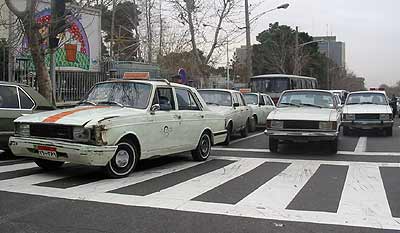
It seems, however, that the Paykan’s days are finally numbered.
Khodro is looking to the future and has ambitious plans to team up with international manufacturers to build luxury cars. The ancient Paykan is no longer part of its long term strategy.
It is being gradually phased out and the final one will roll of the production line some time after 2005.
However the Paykan’s attractive combination of affordability and reliability means it’ll be many years yet before this unlikely object of Iranian national pride and affection finally disappears from Iran’s streets.

Breathing in a lungful of Tehran air is a full-frontal assault on the respiratory system.
Your eyes sting. Your nose burns. Your lungs tighten.
A thick petrochemical smog hangs over this city of 12 million people for much of the year, bathing it in a purply-grey haze. At times the pollution is so bad it blocks the view of the Alborz mountains to the north, where wealthy Tehranis escape to ski and take a break from the chronic overcrowding.
A taxi ride through Tehran can often seem like an afternoon jaunt on the frontline of a war zone.
Cars hurtle in every direction, coughing out exhaust fumes and squeezing through the most impossibly tight gaps in the traffic. Drivers pull out from curbs at wild angles, forcing motorists to swerve suddenly to avoid a collision.
Trying to follow another vehicle through Tehran’s streets is almost impossible because the majority of them are identical. Some 70% of cars on the capital’s roads are battered, white(ish) Paykans.
The Paykan, Iran’s equivalent to the East German Trabant, will look familiar to many British eyes. It’s a locally-made version of the Hillman Hunter, a box-like sedan manufactured in the UK during the 1960s and 1970s.
The Paykan (the word means “arrow” in Farsi) was the first car to be manufactured in Iran, in 1967. Two models were sold at first – the “standard” and the ambitiously named “deluxe.” The range soon expanded to include a Paykan taxi, pick-up and even an automatic model.

Production of the Hillman Hunter ended in Britain in 1979 – but its Iranian brother survived.
Millions of them have rolled off the production line at the state-owned Khodro car plant west of Tehran, providing several generations of Iranians with an affordable, if not particularly luxurious mode of transport.
Pre-revolutionary models are said to be particularly sturdy and surprisingly feisty.
Like workhorse car marques the world over – Skoda, Lada and of course Trabant – the Paykan is the butt of countless jokes. Telling an Iranian friend who’s looking for you in a swarm of traffic that “I’m the one in the white Paykan” is sure to raise a smile. You and every other motorist in Iran, they’ll reply.
Yet the ubiquity of the Paykan has benefits.
Replacement parts are easy to find and any mechanic in Iran can strip one down with his eyes closed.

It seems, however, that the Paykan’s days are finally numbered.
Khodro is looking to the future and has ambitious plans to team up with international manufacturers to build luxury cars. The ancient Paykan is no longer part of its long term strategy.
It is being gradually phased out and the final one will roll of the production line some time after 2005.
However the Paykan’s attractive combination of affordability and reliability means it’ll be many years yet before this unlikely object of Iranian national pride and affection finally disappears from Iran’s streets.
Sunday, February 22, 2004
As I predicted here and here, Ralph Nader has confirmed that he's running for the American presidency.
He told NBC's Meet The Press he'll run as an independent.
It was quite clear from the interview I did with him last month that he'd run, despite receiving thousands of e-mails urging him not to.
It's difficult to be sure whether Nader really wants to challenge the Democrats and Republicans -- or just boost his own ego.
BBC News: Nader announces presidential bid
He told NBC's Meet The Press he'll run as an independent.
It was quite clear from the interview I did with him last month that he'd run, despite receiving thousands of e-mails urging him not to.
It's difficult to be sure whether Nader really wants to challenge the Democrats and Republicans -- or just boost his own ego.
BBC News: Nader announces presidential bid
This afternoon I found a way of bypassing the censorship of Iranian ISPs.
It's through the BGan, a small laptop-like dish that provides high-speed internet access through the Inmarsat satellite network.
We use it to send compressed video files to London without having to pay the high costs involved in buying satellite time from Iranian TV. But it can also be used for normal web-surfing.
it's lightning fast and completely unfiltered.
If only every Iranian could access one.
It's through the BGan, a small laptop-like dish that provides high-speed internet access through the Inmarsat satellite network.
We use it to send compressed video files to London without having to pay the high costs involved in buying satellite time from Iranian TV. But it can also be used for normal web-surfing.
it's lightning fast and completely unfiltered.
If only every Iranian could access one.
Tehran blogger Ara e-mails to explain the vagaries of web surfing in Iran.
He writes:
"The list of forbidden sites varies from ISP to ISP, so my ISP, ParsOnline (the biggest ISP in Iran), doesn't block Hoder's site at all currently while other ISPs do.
"I believe it's because of parallel intelligence services in Iran. They are not in sync with each other at all. There's no legally organized list of banned sites, yet if an ISP does not block a site that someone from the various intelligence communities told them to block then that ISP is in serious trouble."
He writes:
"The list of forbidden sites varies from ISP to ISP, so my ISP, ParsOnline (the biggest ISP in Iran), doesn't block Hoder's site at all currently while other ISPs do.
"I believe it's because of parallel intelligence services in Iran. They are not in sync with each other at all. There's no legally organized list of banned sites, yet if an ISP does not block a site that someone from the various intelligence communities told them to block then that ISP is in serious trouble."
Success at last on the upload front.....
As expected, the hardliners are heading for a sweeping victory in Iran's general election.
What we're seeing is the end of the Reform Era in Iranian politics and the beginning of the Post-Reform Era. The rogressives will now have to build up a new power base and new alliances outside the established political institutions.
Athough the conservatives insist there'll be no "talibanisation" of Iranian society by the emboldened hardliners, it's clear that those who want to liberalise the country will be pushed increasingly to the margins by the clerical establishment.
There are fears in some quarters of a further crackdown on those pushing for political reform now that the hardliners have taken control of another branch of the state -- the parliament, or majlis.
So where now for the reform movement in Iran?
It's a question I discussed with Dr Sadegh Ziba Kalam, a lecturer in Iranian Politics at Tehran University. He says that, with the parliament now in their hands, the conservatives will now turn their attention to next year's presidential election. They'll be looking to take the presidency from the embattled Mohammed Khatami, who came to power in 1997 on a reformist platform.
Audioblog: Sadegh Ziba Kalam Interview (.wma)
As expected, the hardliners are heading for a sweeping victory in Iran's general election.
What we're seeing is the end of the Reform Era in Iranian politics and the beginning of the Post-Reform Era. The rogressives will now have to build up a new power base and new alliances outside the established political institutions.
Athough the conservatives insist there'll be no "talibanisation" of Iranian society by the emboldened hardliners, it's clear that those who want to liberalise the country will be pushed increasingly to the margins by the clerical establishment.
There are fears in some quarters of a further crackdown on those pushing for political reform now that the hardliners have taken control of another branch of the state -- the parliament, or majlis.
So where now for the reform movement in Iran?
It's a question I discussed with Dr Sadegh Ziba Kalam, a lecturer in Iranian Politics at Tehran University. He says that, with the parliament now in their hands, the conservatives will now turn their attention to next year's presidential election. They'll be looking to take the presidency from the embattled Mohammed Khatami, who came to power in 1997 on a reformist platform.
Audioblog: Sadegh Ziba Kalam Interview (.wma)
Maybe yesterday was a fluke because try as I might I can't seem to be able to upload any multimedia today....and I have a great interview I want you all to hear.
I'll keep trying -- but the connections here are painfully slow.
I'll keep trying -- but the connections here are painfully slow.






